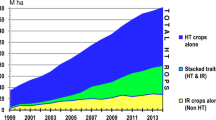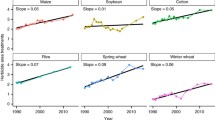Abstract
Canada grows about 11.3 million acres of canola per year, primarily in western regions, making it the largest single producer country. Of that acreage, almost 95% is sown to herbicide tolerant lines. In Canada, regulatory oversight is triggered by the novelty of the product rather than the process by which it was created. Thus a herbicide tolerant crop could be considered as a plant with a novel trait (PNT) and trigger regulation regardless of the whether it was produced using the methods of modern biotechnology or more traditional means such as mutation breeding. PNTs intended for commercial release are subject to an assessment for safety as food, as livestock feed and for release in the environment. This focuses on the issues considered during the risk assessment for environmental release of herbicide tolerant canola, and the subsequent post release risk management. The changes in land management in western Canada as a consequence of the adoption of herbicide tolerant canola and the implications for sustainable agriculture are also considered.


Similar content being viewed by others
References
Champolivier JJ, Gasquez A, Messéan, Richard-Molard M (1999) Management of transgenic crops within the cropping system. In: Gene flow and agriculture: relevance for transgenic crops. British Crop Protection Council, Farnham, pp 233–240
Downey RK (1999) Risk assessment of out-crossing of transgenic Brassica, with focus on B. rapa and B. napus. In: Proceedings 10th international rapeseed congress. Canberra, Australia
Grey TL, Raymer PL, Bridges DC (2006) Weed Technol 20:551–557
Gusta M, Smyth SJ, Belcher K, Phillips PWB, Castle D (2010) Economic benefits of genetically modified herbicide tolerant canola for producers (in press)
Hall L, Topinka K, Huffman J, Davis L, Good A (2000) Weed Sci 48:688–694
Harker KN, Clayton GW, Downey RK (2001) Proc GCIRC bulletin, number 18. Poznan, Pologne
Légère A, Simard MJ, Thomas AG, Pageau D, Lajeunesse J, Warwick SI, Derksen DA (2001) Presence and persistence of volunteer canola in Canadian cropping systems. In: Brighton crop protection conference—weeds. British Crop Protection Council, Farnham, Surrey, UK, pp 143–148
Simpson EC, Norris CE, Law JR, Thomas JE, Sweet JB (1999) Gene flow in genetically modified herbicide tolerant oilseed rape (Brassica napus) in the UK. In: Gene flow and agriculture: relevance for transgenic crops. British Crop Protection Council, Farnham, Surrey, UK, pp 233–240
Smyth S, Gusta M, Philipps P, Castle D (2010) http://canola.ab.ca/uploads/publications/assessing_the_economic_and_ecological_impacts_of_herbicide_tolerant_canola_in_western_canada.pdf. Accessed 25 Nov 2010
Thomas AG, Leeson JY, Van Acker RC (1999) Manitoba weed survey—farm management practices in Manitoba 1997 weed survey questionnaire results. 1997. Weed Survey Ser. Publ. 99-3. Agriculture et agroalimentaire Canada, Saskatoon (Saskatchewan)
Warwick SI, Légère A, Simard MJ, James T (2008) Do escaped transgenes persist in nature? The case of an herbicide resistance transgene in a weedy Brassica rapa population. Mol Ecol 17:1387–1395
Conflict of interest
The author Philip Macdonald declares that the research was not sponsored and that he has no conflict of interest.
Author information
Authors and Affiliations
Corresponding author
Additional information
Conference proceedings: “Decision Making and Science—The Balancing of Risk Based Decisions that Influence Sustainability of Agricultural Production”. 7th and 8th October 2010 in Berlin, Germany. Sponsored by the OECD Co-operative Research Programme.
Rights and permissions
About this article
Cite this article
Macdonald, P. The Canadian experience with novel herbicide tolerant canola. J. Verbr. Lebensm. 6 (Suppl 1), 91–97 (2011). https://doi.org/10.1007/s00003-011-0693-4
Published:
Issue Date:
DOI: https://doi.org/10.1007/s00003-011-0693-4




